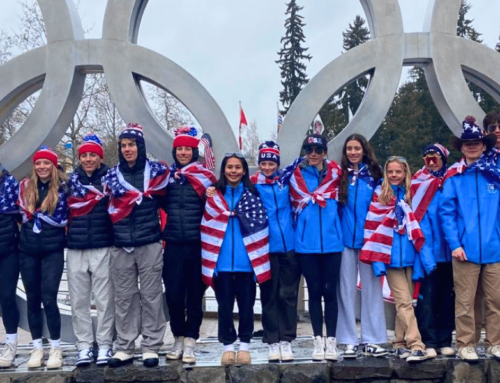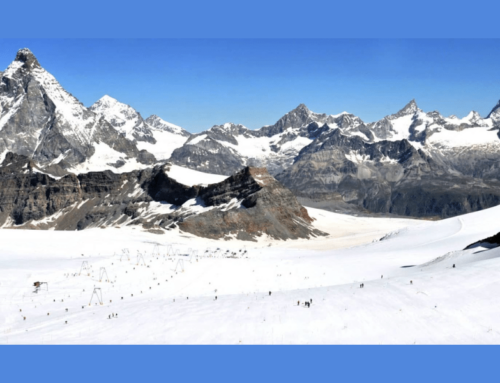Changing of the guard in France as Grange retires
The snow was pelting down on the podium in the Red Tail finish area at Beaver Creek. Huge pillow-like clumps obscured the cameras as the 2015 FIS Alpine Ski World Championships came to an end. Amidst the Rocky Mountain blizzard, one man stood tall — an unlikely victor who had fought all odds to stand proudly as a repeat world champion.
Frenchman Jean-Baptiste Grange’s 2015 slalom gold — a duplication of the 2011 title he won in Garmisch-Partenkirchen — was the penultimate victory of his career. A dominant force in slalom in the late 2000s, Grange’s fortunes took a challenging turn due to injuries. By his own admission, the victory that day in Beaver Creek came as a complete surprise.
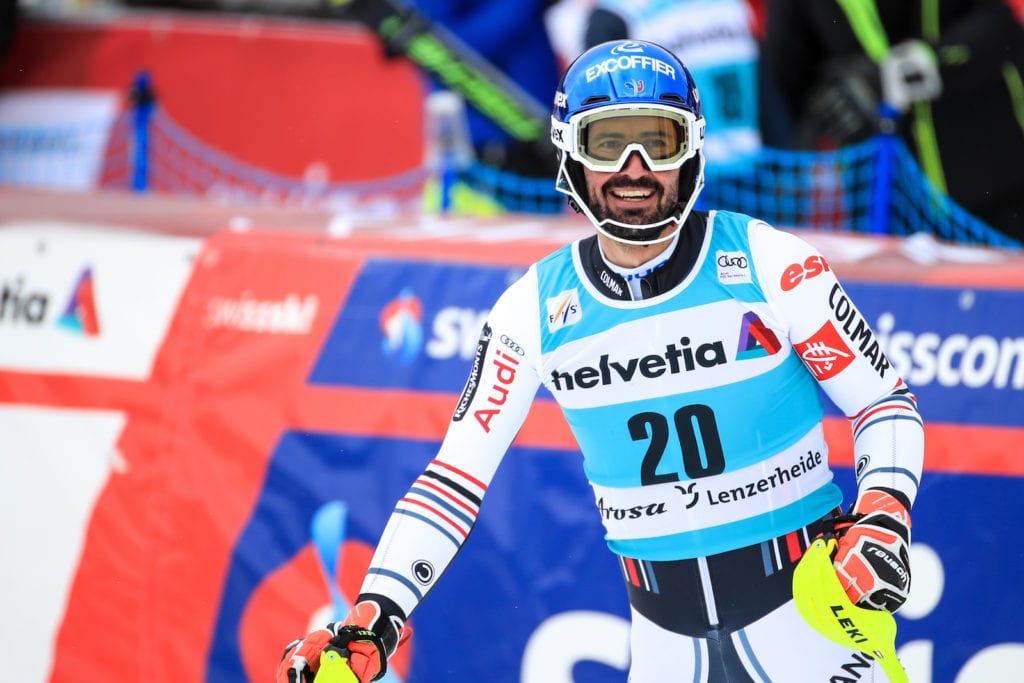
Sunday in Lenzerheide, Grange took his final run at the World Cup Finals, capping a career that saw him win three World Championship medals and the 2009 slalom crystal globe. It was his 197th World Cup start, with nine wins and 18 podiums.
He went out in style, taking a second run victory lap – hugging coaches on the way down and skiing through a gauntlet of French coaches and staff as he crossed the finish, taking a final triumphant ride on the shoulders of his teammates. On the stadium video board, his mother, father and entire family watched from the family business in Valloire.
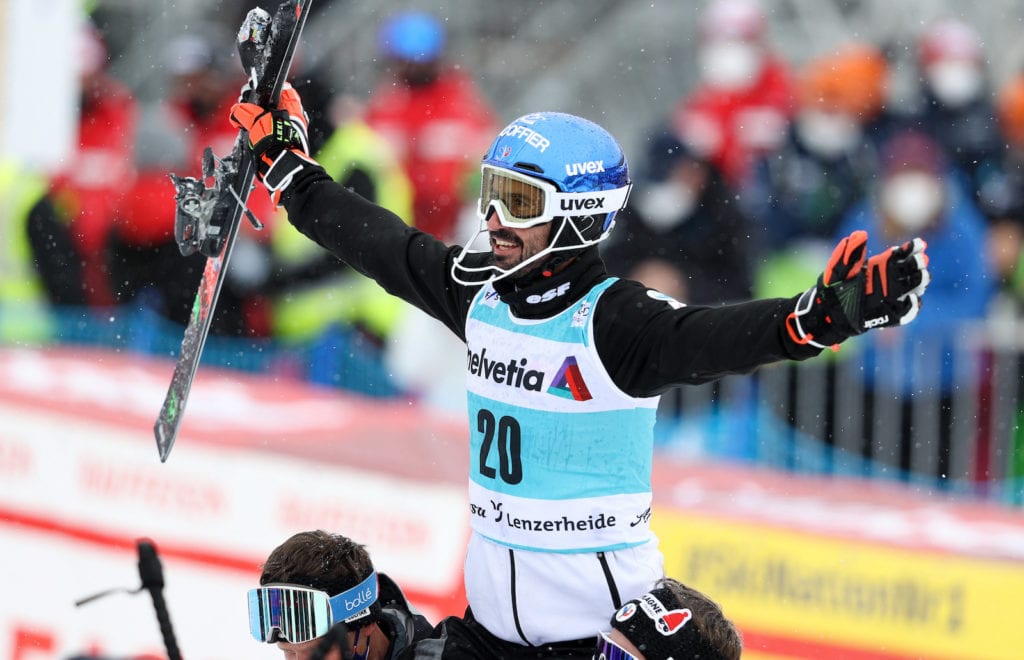
“Lenzerheide was very strong in emotion,” he said the morning after the race. “After the first run I had no more legs and I decided with the staff to do a quiet second run. When I got to the start, all the skiers and coaches applauded — it was very moving. And then a lot of people came to congratulate me, to wish me good luck for the future. It was very emotional.”
It was a fitting day for him to bid au revoir, with his countryman Alexis Pintaurault becoming the first Frenchman to win the overall crystal globe since Luc Alphand in 1996-97.
“After 17 years of the World Cup, it’s time for me to close this beautiful chapter in my life and hang up the skis,” said Grange. “I dedicated my life to this sport and it gave back to me unforgettable moments.”
He and his older French teammate Julien Lizeroux, who retired in January at Schladming, were a formidable force in slalom, later joined by countryman Pinturault and now the rising star Clément Noël – who were both on Sunday’s slalom podium.

“The history of French slalom is made up of beautiful stories,” Grange told Ski Racing Media. “When I arrived, there were the (Sébastien) Amiez, (Jean-Pierre) Vidal and (Pierrick) Bourgeat. With Julien, we continued the story and Clément is obviously a great sequel — magnificent because at his age he has already won as many World Cups as I have. I’m proud to be able to pass on a bit of my experience, but always remaining humble because everyone must make their way and move forward with their own tools.”
Grange grew up in the heart of the French Savoie region, born in the village of St. Jean de Maurienne amidst towering alpine peaks including the legendary Col du Galibier of Tour de France fame. Ski racing was in his blood, with his parents, aunt and uncle all past members of the French ski team. He was on skis at an early age with Ski Club Valloire.
When he was just seven in 1992, the Olympics came to his region. Like thousands of kids across the Savoie, the Games instilled a special spirit in youth. For Jean-Baptiste, it came close to home as he watched his eight-year old brother, François-Cyrille, light the Olympic flame at the stadium in Albertville – a Savoie school boy standing aside French football legend Michel Patini high atop the Théâtre des Cérémonies.
As he reflected on his childhood, Grange felt strongly about the support he received from his family. His parents never pushed him into ski racing, despite their background. But he was immersed in the sport at his home in Valloire. Then, at age 10, he was diagnosed with sciatica and two herniated lumbar disks. Doctors initially said he would never ski again. But three months in a plaster cast then a year-and-a-half in a corset, he was back ski racing.
During that time, Valloire was the regular site of a Europa Cup giant slalom every December. In January, 1996, the white circus came to town with the best ski racers in the world skiing a super-G won by Austria’s Hans Knauss. As a young ski racer, that exposure was key to his motivation to continue in the sport.
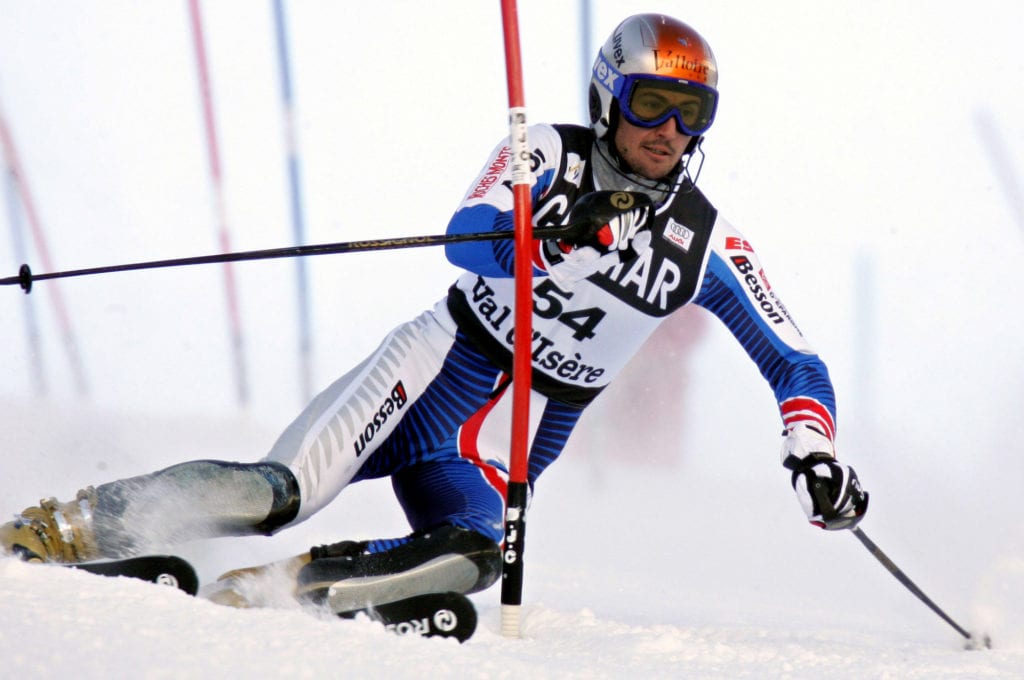
Grange debuted on the Europa Cup at 17 in 2001, then made two Junior Worlds teams in 2003 and 2004, getting his first World Cup start in 2004. Two seasons later he moved on to the World Cup full time, focusing mainly on slalom and combined, notching a 10th in the Kitzbühel slalom behind his countryman Jean-Pierre Vidal, who took the win. That November, he was seventh in the Beaver Creek combined then went to Alta Badia where he took eighth in slalom. He finished 10th in the 2006-07 World Cup slalom standings.
His breakout came in the 2007-08 season, opening with his first World Cup podium — a second in super combined at Beaver Creek. He then blitzed to a slalom win in Alta Badia, slalom and super combined titles in Wengen, won the Kitzbühel slalom and was second in Schladming.
He went into the World Cup Finals at Bormio with a 21-point lead over Manfred Moelgg of Italy. Moelgg led the first run with Grange fourth. Needing only to finish second to claim France’s first slalom title in over a decade, he faltered as he neared the line, finishing out of the points as Moelgg cruised to an easy win and the crystal globe.

The next year he came out of the gate hot, winning the slalom opener in Levi. Two weeks later he was second in combined in Val d’Isere. He was second in the Alta Badia slalom. In early January, under the lights in Zagreb, he stormed from behind in the second run to knock out Croatian favorite Ivica Kostelic to grab the Snow Queen Trophy by a mere five-hundredths.
In late January, Grange and Lizeroux teamed up in one of the more tense Hahnenkamm slaloms ever in Kitzbühel. Grange stood second after the first run to Reinfried Herbst with Lizeroux seventh. In a brilliant second run performance, Lizeroux overcame a full second deficit to Grange and took the win by .08 with Grange second — knocking Austrian star Marcel Hirscher off the podium. It was the first one-two slalom finish for France since 1982.
But it was a bittersweet year for Grange as the World Championships came to Val d’Isere. Standing third after the first run of slalom, he went out in the second with Lizeroux moving up to take silver. Similarly in the combined, Grange was standing fourth after the downhill and poised for gold. In the slalom, he went out as Lizeroux advanced Ted Ligety-style from 2.93 seconds out to take silver. Grange’s lone finish came in giant slalom where he finished seventh.

A month after Val d’Isere, Grange found himself in position again to claim a crystal globe at the World Cup Finals in Åre. This time he got the job done, finishing third behind Austria’s Mario Matt and Lizeroux to clinch the crystal.
But his rapid growth as one of the tour’s top slalom skiers would take a turn for the worse at the start of the Olympic season. Skiing in the giant slalom at Beaver Creek, Grange completed the first run but suffered a knee injury. While he maintained that his ACL and MCL were intact, he still opted for surgery, missing the 2010 Olympics in Whistler.
Grange came into the 2010-11 season with a full tech schedule, taking another slalom win in Levi. For the next six weeks, he was off his game until he skied onto the podium in Wengen and won the next week in Kitzbühel and then Schladming. Despite his three slalom wins, he sat second a full 96 points behind Kostelic in the battle for the crystal globe — the result of a pair of DNFs.
By the World Championships in Garmisch-Partenkirchen, he was firing on all cylinders. He led Moelgg by .22 after one run and ran away with the gold medal. It was the first French slalom world championship title since Jean-Noel Augert and Patrick Russel went gold-silver in 1970 at Val Gardena.
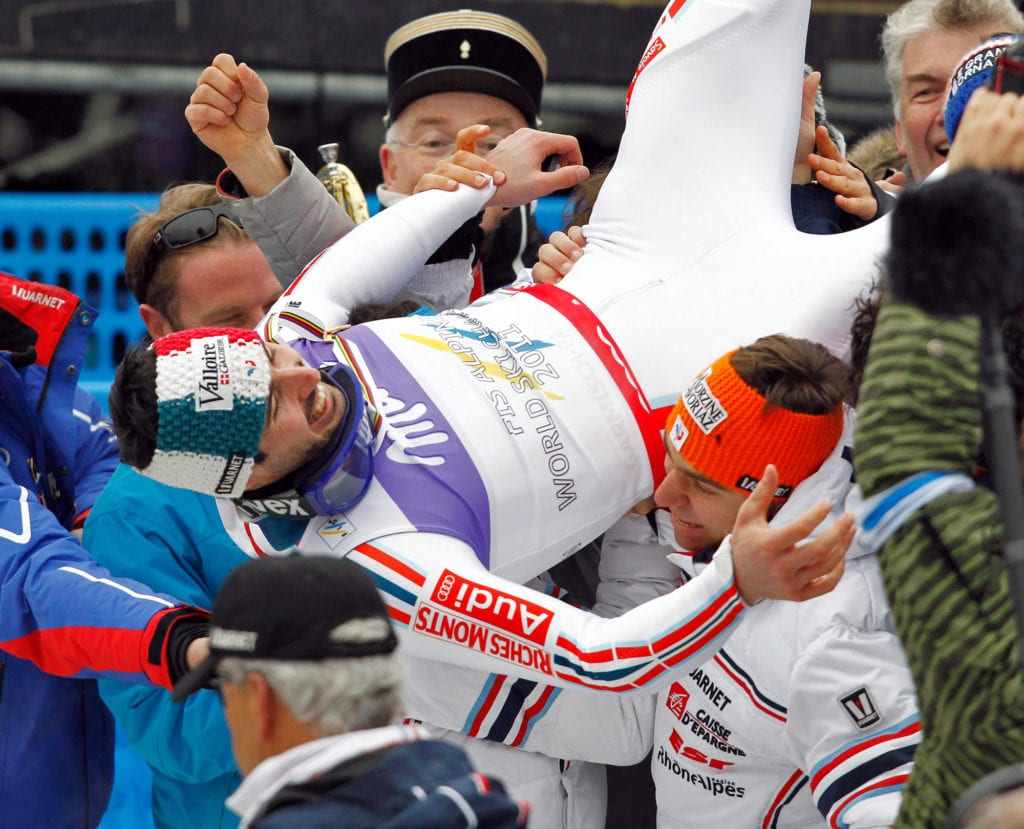
With gold medal in hand, Grange went about attacking Kostelic for the slalom globe. In Bansko, the Croatian went out while Grange finished third — cutting the margin from 96 to 36. At Kranjska Gora, in a race where American Nolan Kasper finished second, both Grange and Kostelic went out setting up a nail-biter at the World Cup Finals in Lenzerheide. But the matchup never materialized, with Grange going out on the first run and Kostelic taking the slalom and overall globes.
His February, 2011 podium in Bansko would become a milestone. It marked the final time he was able to crack the top three in the World Cup, save a 2017 team event in Aspen. He struggled with knee, shoulder and back injuries, oftentimes skiing with great pain. He pondered his future. But he persevered. After the 2012 season, the lifelong Rossignol skier switched to Fischer (he would return back to Rossignol five years later) and underwent yet another surgery. Still, the results didn’t come back at the same level. He started dropping down to Europa Cups to find the feel again. He was dominant there, but couldn’t get it to translate to the World Cup.
Which brings us to the 2015 World Championships in Beaver Creek.
Grange’s 2015 season was a blend of a few top-10s with top-30s. A sixth in the Adelboden slalom was the best he could muster. So, while he earned a spot on the French team for World Championships, he was anything but a favorite. A year earlier at the Sochi Olympics, he had been fifth in the first run before going out.
Beaver Creek held many memories for Grange. It was the site of his first podium. But it was also where he injured his knee, keeping him out of the 2010 Olympics.

“I’ve had big emotions here in Beaver Creek, both bad and really good,” Grange told The New York Times. “I was thinking about all the struggles I’ve had, and thinking about the people I care about.”
France had opened the championships with a super-G bronze from Adrien Theaux. But the podium then remained elusive. Grange started the slalom 14th, skiing to fifth in the first run, .88 behind Hirscher. It was a decent performance, and put him in range of a medal. But few in the stadium saw him as a gold medal contender.
Between runs, it began to snow. Dumping. Visibility decreased and surface conditions became sketchy. As the weather worsened, Grange stood at the top waiting his start and watching while Jens Byggmark, Patrick Thaler, Pinturault and Stefano Gross all skied out. Germany’s Felix Neureuther shook his head in the finish as he somehow plowed through the snow to take the lead. His teammate Fritz Dopfer followed to eclipse his time.
And now it was up to Grange.
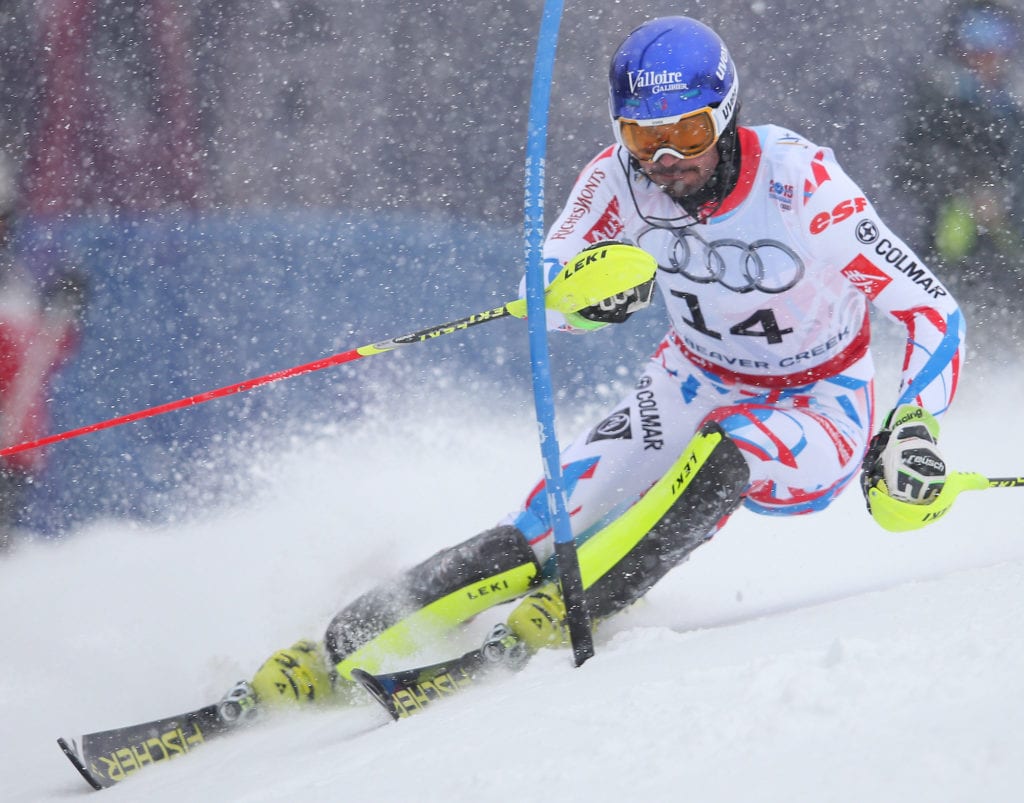
It was a run for the ages. With nothing to lose, he tuned out the pain and charged out into the blizzard. For 53.21 seconds he skied precision slalom. He took his narrow .05 first run lead over Dopfer and built on it, extending it to a half-second at one point before finishing with a .35 spread.
On the live French-language Eurosport coverage beamed back to France, commentators Alexandre Pasteur and the 2002 Olympic slalom champion Jean-Pierre Vidal were beside themselves screaming with passion in the broadcast booth. Was this really a gold medal run for the legendary Jean-Baptiste Grange?
As he circled the finish, he looked to the heavens and pumped his fists. He didn’t yet have a medal around his neck, but he had skied the kind of run that had given him nine World Cup victories. But now, he could only sit in the leader’s box and wait.
Sweden’s Mattias Hargin came next, but couldn’t get it done, dropping to fifth. His teammate Andre Myhrer was next, falling to sixth. Grange now had at least a bronze. Then came the Russian, Alexander Khorsoshilov, who plummeted to eighth. There was just one skier between Grange and a gold medal — Austria’s Marcel Hirscher.

As Hirscher slid into the start, NBC flashed a trivia point on its screen. Since 2002, the first run leader has won every slalom at the Olympics and World Championships. The snowfall had increased dramatically by the time Hirscher pushed onto the course.
The Austrian was strong at the top, but had still given up nearly two-tenths of his .88 lead at the first intermediate. As he skied down to the middle section of the course he started to get behind. The lead dropped to .45. He got in the back seat and dropped even further to a mere .06 margin. He sensed he was in danger and pushed even harder, suddenly straddling a gate and skiing out with the finish in sight.
As La Marseillaise played for the first time at the 2015 World Championships, Grange had a feeling of satisfaction in his heart for how far he had come.
“In a big event like World Championship or Olympic Games, it’s always a lot of stress and lots of pressure and you are not always feeling good,” Grange told Ski Racing after the race. “But you have to believe in yourself. I don’t know – today was my day. Today was my day.”
After Sunday’s finale in Switzerland, Grange reflected back over his career. “All the victories are great memories but my second title in Beaver Creek was one of the strongest after the injuries,” he said. “We were very well received in Beaver Creek with a very professional organization. But we also felt from the volunteers and the public a real enthusiasm for the teams. These were my best World Championships.”
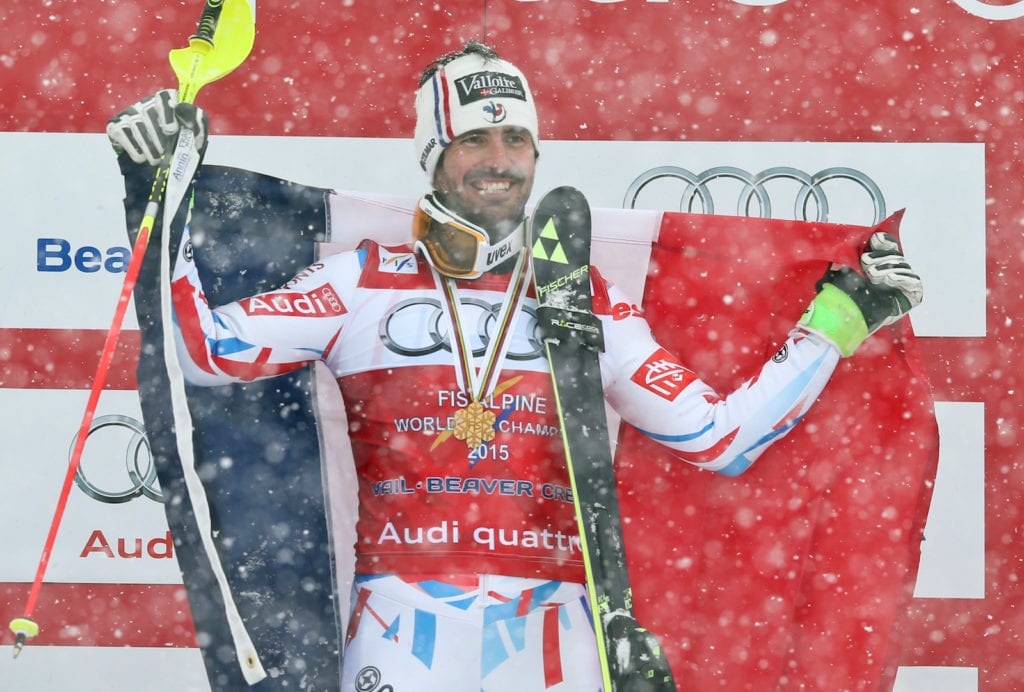
Today, six years later at the age of 36, it was time to close the book on the White Circus. Many thought he would retire after a 2019 knee injury. But he was back the next season.
With a six-month old daughter, life is taking on a different meaning for the French champion. He had watched other friends and teammates like Lizeroux and Ted Ligety retire this year. It was his time.
“You are and were amazing. You were clutch. Welcome to the other side,” wrote fellow 1984 YOB Ligety on Instagram.
“What a long way and what happiness,” wrote Grange. “I cannot thank enough all the enthusiasts who accompanied me in the most beautiful moments as well as the most difficult ones. Skiing is my life, my passion and it will remain so!”
The life of a ski racer is hard – three to four months on the road training every summer and fall, then a tour that spans six months from October to March. Like those who came before him, now it’s his turn to take a break.
“I will take the time now, for myself and my family, to put my bags down, to enjoy things that I couldn’t do it when I was a high level athlete – either for fear of getting hurt or for lack of time. There is the family store in Valloire that motivates me.”
But don’t expect him to move far from ski racing. “I can still bring some things for young people or through, why not, commentating on TV.
“But I don’t want to stress myself out. I want to take a little time to breathe. I really feel like I made it to the end, so I want to take a breather.”
Au revoir, JB. Carrière exceptionnelle!

